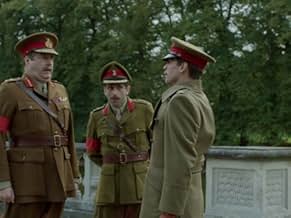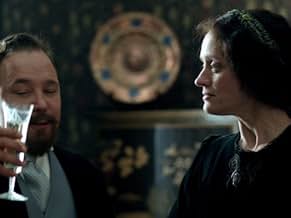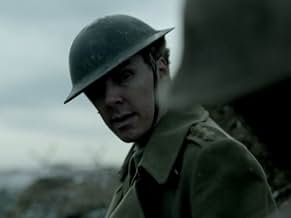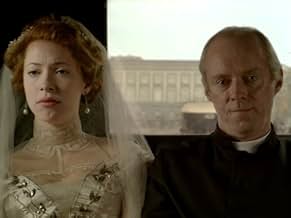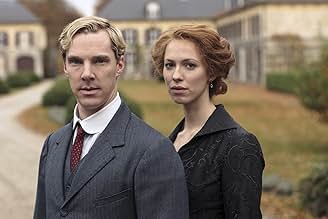Ajouter une intrigue dans votre langueRevolves around a love triangle between a conservative English aristocrat, his mean socialite wife and a young suffragette.Revolves around a love triangle between a conservative English aristocrat, his mean socialite wife and a young suffragette.Revolves around a love triangle between a conservative English aristocrat, his mean socialite wife and a young suffragette.
- Nommé pour 5 Primetime Emmys
- 8 victoires et 36 nominations au total
Parcourir les épisodes
Avis à la une
Before "Parade's End," Rebecca Hall and Benedict Cumberbatch were last paired professionally in an unassuming romantic comedy called "Starter for 10," a film anchored by their friend James McAvoy. All three played university students. Although each turned in a good performance, the roles were not ones that required much acting range. In Parade's End, however, the roles of Sylvia and Christopher Tietjens allow both Hall and Cumberbatch to flex their considerable acting muscles. When both are in a scene, the scene is so riveting that it is hard to know which actor to watch.
Over the years, the 36-year-old Cumberbatch has built an impressive portfolio of work. He has been accurately described as a chameleon. He so completely invests himself in a role that it is sometimes hard to recognize the actor behind the character.
As Sylvia Tietjens, wife of wealthy landowner Christopher Tietjens, Hall holds her own against Cumberbatch. Her Sylvia is smart, narcissistic, beautiful, lusty, manipulative, and utterly fascinating. Her rival, suffragette Valentine Wannop, pales in comparison. While the younger Valentine is sweet, loyal, and plucky, she doesn't have Sylvia's fire.
Which woman will Christopher choose? You'll have to watch the series to find out. Along the way, you'll enjoy not only the performances of the three principal actors, but also the performances of a wonderful ensemble of able actors, including Rupert Everett, Anne-Marie Duff (coincidentally, the wife of James McAvoy, who joined Hall and Cumberbatch in "Starter for 10"), and others.
Over the years, the 36-year-old Cumberbatch has built an impressive portfolio of work. He has been accurately described as a chameleon. He so completely invests himself in a role that it is sometimes hard to recognize the actor behind the character.
As Sylvia Tietjens, wife of wealthy landowner Christopher Tietjens, Hall holds her own against Cumberbatch. Her Sylvia is smart, narcissistic, beautiful, lusty, manipulative, and utterly fascinating. Her rival, suffragette Valentine Wannop, pales in comparison. While the younger Valentine is sweet, loyal, and plucky, she doesn't have Sylvia's fire.
Which woman will Christopher choose? You'll have to watch the series to find out. Along the way, you'll enjoy not only the performances of the three principal actors, but also the performances of a wonderful ensemble of able actors, including Rupert Everett, Anne-Marie Duff (coincidentally, the wife of James McAvoy, who joined Hall and Cumberbatch in "Starter for 10"), and others.
The first thing about this series is that the photography and production design is sumptuous and stunning. Even if the story and characters were of no interest, the visual appeal of this is memorable.
The only strange thing in this aspect of the production is that the music in scenes for the parties is jazz - 1920s sounding jazz. It is very odd and historically inaccurate for the social status of the story as jazz entered England in 1919, apparently.
As to the core of it, well, it is an abbreviated working of a complex set of novels written in a certain way and Stoppard has done well with the time limits etc of the medium. It works but one is always aware of what is being abridged to make it fit.
Cumberbatch is the most intense, internal English leading man in a long while and seems to have borrowed Jeremy Irons's mandible crunching pensiveness. But he is absolutely right here.
Hall as Sylvia Tietjens is ravishing and confused in right order. Her performance is entitled' and arrogant, though it might be a bit too modern in its overtness.
Highly recommended.
The only strange thing in this aspect of the production is that the music in scenes for the parties is jazz - 1920s sounding jazz. It is very odd and historically inaccurate for the social status of the story as jazz entered England in 1919, apparently.
As to the core of it, well, it is an abbreviated working of a complex set of novels written in a certain way and Stoppard has done well with the time limits etc of the medium. It works but one is always aware of what is being abridged to make it fit.
Cumberbatch is the most intense, internal English leading man in a long while and seems to have borrowed Jeremy Irons's mandible crunching pensiveness. But he is absolutely right here.
Hall as Sylvia Tietjens is ravishing and confused in right order. Her performance is entitled' and arrogant, though it might be a bit too modern in its overtness.
Highly recommended.
Not since A Dance to the Music of Time has such a stellar cast been allied to such an artful and unusual script.
Ford Madox Ford is not a popular novelist. His work often approaches its subjects on an elliptical curve, his principal characters are seldom in the mainstream of society, forming odd relationships, requiring his audience to assimilate their understanding of them over the course of a whole work rather than categorise from their experience (or jump to conclusions based on genre). This explains why we don't see his work adapted very often. Or even at all.
Susanna White and Tom Stoppard have both grasped the nettle of demonstrating this sideways approach, though I'm not sure quite so many kaleidoscopic shots were necessary to drive the point home. Benedict Cumberbatch joins in, underlining his character's isolation with some rather off-putting facial gestures. Ronald Hines played Tietjens in the now lost 1960's adaptation and casting to type may have worked better than struggling with toning down the matinée idol status Cumberbatch has acquired since hitting Sherlock Holmes out of the park. Maybe if he and Stephen Graham had swapped roles the other characters might have found it easier to deal with Tietjens' self-enforced oddity but that may have impaired Ford's central point, beautifully delivered as the the climax to Episode 4.
But acting idiosyncrasies cannot mask the quality of the fabulous script or the overall adaptation which has a towering performance from Rebecca Hall and glittering additions from Rufus Sewell, Rupert Everett, Miranda Richardson, Roger Allam, Ann-Marie Duff and beautiful, note-perfect newcomer Adele Clemens.
With so much glossy soap about, it is extremely refreshing to have high quality, thought-provoking, challenging drama this good whatever the lead chooses to do with his jaw muscles.
A keeper.
Ford Madox Ford is not a popular novelist. His work often approaches its subjects on an elliptical curve, his principal characters are seldom in the mainstream of society, forming odd relationships, requiring his audience to assimilate their understanding of them over the course of a whole work rather than categorise from their experience (or jump to conclusions based on genre). This explains why we don't see his work adapted very often. Or even at all.
Susanna White and Tom Stoppard have both grasped the nettle of demonstrating this sideways approach, though I'm not sure quite so many kaleidoscopic shots were necessary to drive the point home. Benedict Cumberbatch joins in, underlining his character's isolation with some rather off-putting facial gestures. Ronald Hines played Tietjens in the now lost 1960's adaptation and casting to type may have worked better than struggling with toning down the matinée idol status Cumberbatch has acquired since hitting Sherlock Holmes out of the park. Maybe if he and Stephen Graham had swapped roles the other characters might have found it easier to deal with Tietjens' self-enforced oddity but that may have impaired Ford's central point, beautifully delivered as the the climax to Episode 4.
But acting idiosyncrasies cannot mask the quality of the fabulous script or the overall adaptation which has a towering performance from Rebecca Hall and glittering additions from Rufus Sewell, Rupert Everett, Miranda Richardson, Roger Allam, Ann-Marie Duff and beautiful, note-perfect newcomer Adele Clemens.
With so much glossy soap about, it is extremely refreshing to have high quality, thought-provoking, challenging drama this good whatever the lead chooses to do with his jaw muscles.
A keeper.
I'm sure that HBO marketing execs were relieved that, if they were going to get behind a 5-part series based on Ford Madox Ford's complex and not terribly well known 20th-century masterpiece, at least some of it would be set in a stately home in the north of England, like that other show about the downtown abbey.
Ford's a great one for interior monologue and multiple points of view and such, but Tom Stoppard's masterly adaptation channels the great muddy river of his prose into a lively, involving narrative—though there's still enough time-shifting and flashbacking, even some Eisenstein-style montage, to do honor to Ford's avant-garde intentions. Considering what difficult material he's dealing with, it's one of the best TV adaptations ever!
Benedict Cumberbatch has always done well in period films, and he seems like the only possible choice for Christopher Tietjens, a self-styled 18th-century gentleman (the time period of the series is roughly 1908-19) and omniscient civil servant, but obstinate, brusque and arrogant as well (maybe even a little like Sherlock?). Rebecca Hall is riveting and surprisingly sympathetic as Tietjens's deceitful wife, Sylvia, and Aussie actress Adelaide Clemens is a revelation as Valentine, the virginal suffragette he meets and falls in love with in two of the series's most powerful scenes. (Tietjens and Sylvia, though usually at cross-purposes, are determined not to divorce—it's complicated .)
Tietjens is described by one of his wife's admirers as a "bloody great bolster" of a man—BC didn't have time to bulk up for the part, obviously—but he emerges as a poignant, even romantic, figure, with only the memory of the night he falls in love with Valentine to sustain him through six years of frustration, disappointment and danger. Perhaps it's easy to see why some viewers didn't find this storyline or this character very "relatable."
Long story short, '"Parade's End" isn't as accessible as an original costume drama devised for a contemporary audience, like "Downton," but it's decidedly worth watching. We didn't have a problem with BC's enunciation, but some of the dialogue, especially in the scenes with excited Welsh soldiers in the trenches, is admittedly not so easy to follow. (Next time we'll try the subtitles.) Great cinematography; kudos to the first-rate British cast, with special mention to Stephen Graham as Tietjens's fair-weather friend Macmasters and Rufus Sewell in a Pythonesque turn as a sex-crazed clergyman. An interview with Stoppard on disc two sheds some light on his process.
Ford's a great one for interior monologue and multiple points of view and such, but Tom Stoppard's masterly adaptation channels the great muddy river of his prose into a lively, involving narrative—though there's still enough time-shifting and flashbacking, even some Eisenstein-style montage, to do honor to Ford's avant-garde intentions. Considering what difficult material he's dealing with, it's one of the best TV adaptations ever!
Benedict Cumberbatch has always done well in period films, and he seems like the only possible choice for Christopher Tietjens, a self-styled 18th-century gentleman (the time period of the series is roughly 1908-19) and omniscient civil servant, but obstinate, brusque and arrogant as well (maybe even a little like Sherlock?). Rebecca Hall is riveting and surprisingly sympathetic as Tietjens's deceitful wife, Sylvia, and Aussie actress Adelaide Clemens is a revelation as Valentine, the virginal suffragette he meets and falls in love with in two of the series's most powerful scenes. (Tietjens and Sylvia, though usually at cross-purposes, are determined not to divorce—it's complicated .)
Tietjens is described by one of his wife's admirers as a "bloody great bolster" of a man—BC didn't have time to bulk up for the part, obviously—but he emerges as a poignant, even romantic, figure, with only the memory of the night he falls in love with Valentine to sustain him through six years of frustration, disappointment and danger. Perhaps it's easy to see why some viewers didn't find this storyline or this character very "relatable."
Long story short, '"Parade's End" isn't as accessible as an original costume drama devised for a contemporary audience, like "Downton," but it's decidedly worth watching. We didn't have a problem with BC's enunciation, but some of the dialogue, especially in the scenes with excited Welsh soldiers in the trenches, is admittedly not so easy to follow. (Next time we'll try the subtitles.) Great cinematography; kudos to the first-rate British cast, with special mention to Stephen Graham as Tietjens's fair-weather friend Macmasters and Rufus Sewell in a Pythonesque turn as a sex-crazed clergyman. An interview with Stoppard on disc two sheds some light on his process.
"Parade's End" is a five-part miniseries from England starring Benedict Cumberbatch, Rebecca Hall, Rupert Everett, Miranda Richardson, and Janet McTeer. Based on the novel by Ford Maddox Ford, the script was written by Tom Stoppard.
The story is about the British upper class pre- and during World War I, focusing on Christopher Tietjens (Cumberbatch) and his wife Sylvia (Rebecca Hall). Christopher is an honorable man and extremely repressed, it seems - he won't sleep with the woman he loves (Adelaide Clemens) because he's married, but then he's not sleeping with his wife, who has been unfaithful to him and may or may not have given birth to their son.
Tietjens eventually joins the war office rather than staying in safety because he considers it more honest than what he's being asked to do at his job as a government statistician.
I didn't read the book -- according to the reviews, the role of Sylvia is not supposed to be sympathetic, and Rebecca Hall has been criticized for this. I would submit it's not her fault, it's the director's - I'm sure she could have acted the role any way she was requested to do it.
The director cast young Adelaide Clemens as Tietjens' would-be mistress, though their relationship isn't consummated before or during the war. I have to agree with reviews, for a suffragette, she's pretty vapid.
Benedict Cumberbatch is one of the greatest actors today, and again, as reviews have pointed out, he has now achieved matinée idol status. Originally HBO did not want him in this series because they didn't know who he was; by the time the series was ready to be filmed, they said it had to be with Benedict or they wouldn't do it! Christopher isn't supposed to be a matinée idol - he's described as bulky and unattractive. Cumberbatch gained weight for the role to make himself look a little bigger, though by no means bulky, and he wore inserts in his face to kill those incredibly high cheekbones. He also does something with the jaw area - he had jowls and an unusual way of using his mouth, which has been compared to Edward Fox's and Jeremy Irons' jaw movements. It's part of his characterization, so he actually doesn't look like the dashing Sherlock, between that, his weight, and his lighter hair. He's also lowered his voice, which was pretty low to begin with.
All in all, it's a brilliant performance. He really is a true chameleon. Christopher, however, to Americans anyway, is difficult to understand with his uptightness and his honor, just like one lost patience with Ashley Wilkes and his mixed messages to Scarlett.
And since Cumberbatch is now a matinée idol and if you're a woman, what you're waiting for is some sex and boy, there wasn't much of that, though we did get to see his bare chest when his shirt was open. Wow. We who have seen him do love scenes, such as in The Last Enemy, were left pretty much like Sylvia -- frustrated.
There are some beautiful scenes and some very gritty war scenes, plus lots of symbolism to be had. This series has been compared to Downton Abbey but it is in no way a soap opera. It's much more subtle; it moves slowly, as that way of life did, with everything looking good on the surface but bubbling with scandal and problems underneath.
A great effort that succeeds in part, with some wonderful acting.
The story is about the British upper class pre- and during World War I, focusing on Christopher Tietjens (Cumberbatch) and his wife Sylvia (Rebecca Hall). Christopher is an honorable man and extremely repressed, it seems - he won't sleep with the woman he loves (Adelaide Clemens) because he's married, but then he's not sleeping with his wife, who has been unfaithful to him and may or may not have given birth to their son.
Tietjens eventually joins the war office rather than staying in safety because he considers it more honest than what he's being asked to do at his job as a government statistician.
I didn't read the book -- according to the reviews, the role of Sylvia is not supposed to be sympathetic, and Rebecca Hall has been criticized for this. I would submit it's not her fault, it's the director's - I'm sure she could have acted the role any way she was requested to do it.
The director cast young Adelaide Clemens as Tietjens' would-be mistress, though their relationship isn't consummated before or during the war. I have to agree with reviews, for a suffragette, she's pretty vapid.
Benedict Cumberbatch is one of the greatest actors today, and again, as reviews have pointed out, he has now achieved matinée idol status. Originally HBO did not want him in this series because they didn't know who he was; by the time the series was ready to be filmed, they said it had to be with Benedict or they wouldn't do it! Christopher isn't supposed to be a matinée idol - he's described as bulky and unattractive. Cumberbatch gained weight for the role to make himself look a little bigger, though by no means bulky, and he wore inserts in his face to kill those incredibly high cheekbones. He also does something with the jaw area - he had jowls and an unusual way of using his mouth, which has been compared to Edward Fox's and Jeremy Irons' jaw movements. It's part of his characterization, so he actually doesn't look like the dashing Sherlock, between that, his weight, and his lighter hair. He's also lowered his voice, which was pretty low to begin with.
All in all, it's a brilliant performance. He really is a true chameleon. Christopher, however, to Americans anyway, is difficult to understand with his uptightness and his honor, just like one lost patience with Ashley Wilkes and his mixed messages to Scarlett.
And since Cumberbatch is now a matinée idol and if you're a woman, what you're waiting for is some sex and boy, there wasn't much of that, though we did get to see his bare chest when his shirt was open. Wow. We who have seen him do love scenes, such as in The Last Enemy, were left pretty much like Sylvia -- frustrated.
There are some beautiful scenes and some very gritty war scenes, plus lots of symbolism to be had. This series has been compared to Downton Abbey but it is in no way a soap opera. It's much more subtle; it moves slowly, as that way of life did, with everything looking good on the surface but bubbling with scandal and problems underneath.
A great effort that succeeds in part, with some wonderful acting.
Le saviez-vous
- AnecdotesBenedict Cumberbatch claimed that his character of Christopher Tietjen was one of the more admirable he has ever played. He claimed "[Christopher] has many admirable qualities I'd like to siphon off into my life."
- GaffesSylvia and Bobbie smoke cigarettes, but several others certainly would have been smokers, including the Ladies Macmaster, Wonnop, Satterthwaite, Marie-Leonie, and Claudine.
- ConnexionsFeatured in The Wright Stuff: Épisode #17.165 (2012)
Meilleurs choix
Connectez-vous pour évaluer et suivre la liste de favoris afin de recevoir des recommandations personnalisées
- How many seasons does Parade's End have?Alimenté par Alexa
Détails
- Date de sortie
- Pays d’origine
- Langue
- Aussi connu sous le nom de
- Geçit Töreni Sonu
- Lieux de tournage
- Duncombe Park, Helmsley, York, North Yorkshire, Angleterre, Royaume-Uni(Groby Hall: Tietjens family's country estate)
- Sociétés de production
- Voir plus de crédits d'entreprise sur IMDbPro
Contribuer à cette page
Suggérer une modification ou ajouter du contenu manquant


